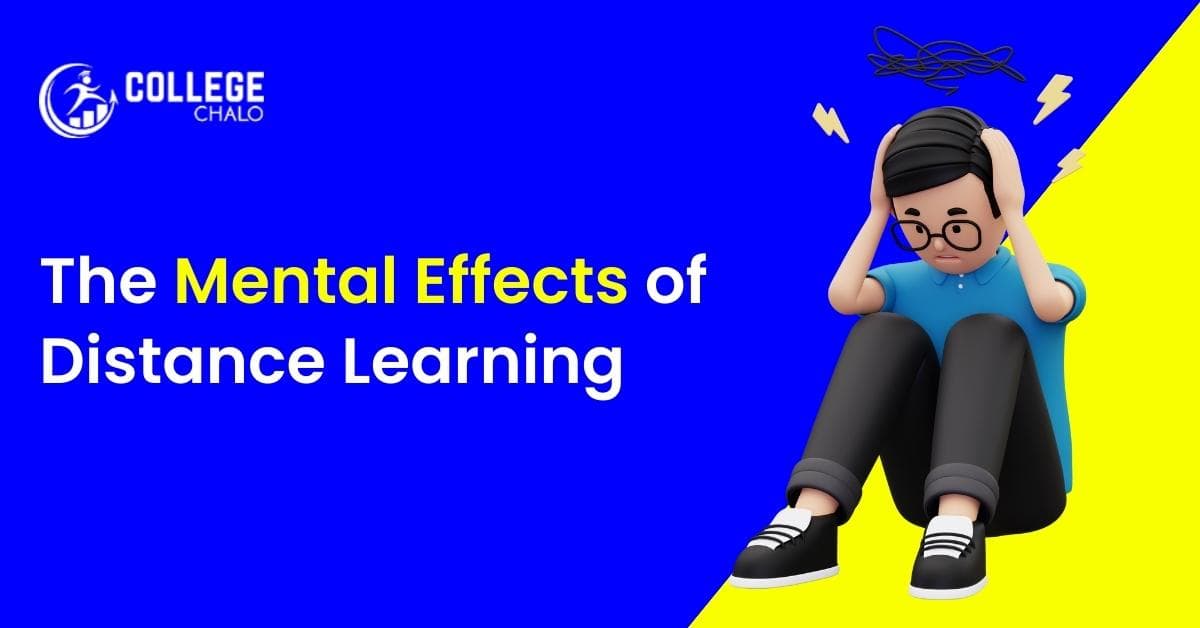The Mental Effects of Distance Learning

The Mental Effects of Distance Learning
Distance learning became the norm for students all around the world as a result of the COVID-19 epidemic, which caused an unprecedented change in the educational landscape. Although this method of instruction has helped maintain continuity through difficult times, it is important to consider how it can affect students’ mental health. Also, read about the Mental Aspect of Educations Importance.


1) Isolation and loneliness
This is First on the list of Mental Effects of Distance Learning. When students learn remotely, they frequently live apart from their classmates and teachers. Feelings of loneliness and isolation can have a negative effect on mental health if there aren’t any face-to-face encounters.

2) Increased screen time
The next on the list of Mental Effects of Distance Learning is Increased screen time. Students who are enrolled in remote learning spend more time in front of screens, attending virtual classes, doing assignments, and taking part in conversations online.
Spending too much time in front of a screen can cause eye strain, headaches, and attention problems. This may intensify feelings of physical and mental tiredness.

3) Reduced regularity and structure
The next on the list of Mental Effects of Distance Learning is Reduced regularity and structure. Traditional classrooms offer a regulated setting with predetermined routines, which can help students feel stable and predictable.
Contrarily, distance learning frequently lacks a regular schedule, making it difficult for students to achieve a healthy work-life balance. Lack of organisation can result in procrastination, less production, and increased levels of stress.

4) Limited access to resources and assistance
The next on the list of Mental Effects of Distance Learning is Limited access to resources and assistance. Accessing educational resources and support services may be difficult for distance learners. Students’ access to textbooks, libraries, laboratories, and specialised equipment may be restricted, which affects how well they study.
A lack of direct communication with peers and teachers can also make it more difficult to get rapid answers to questions and lessen emotional support.
5) Increased responsibility and self-motivation
The next on the list of Mental Effects of Distance Learning is Increased responsibility and self-motivation. Self-motivatioLimited access to resources and assistance and increased responsibility are important aspects of distance learning since they demand students manage their time, create objectives, and stay motivated on their own.


6) Lack of movement
The next on the list of Mental Effects of Distance Learning is Lack of movement. In traditional classrooms, students have the chance to walk about during breaks or physical education sessions. Such chances are limited by distance schooling, which promotes a more sedentary way of life.
Students’ mental health may suffer if they are not physically active, as regular exercise is essential for lowering stress levels and enhancing general mental health.
7) Focus and memory issues
The next on the list of Mental Effects of Distance Learning is Focus and memory issues. Online learning environments and virtual classrooms may have distractions that make it difficult for pupils to focus and remember the material.

Also, read: India’s Most Expensive Schools
8) Parental involvement and support
The next on the list of Mental Effects of Distance Learning is Parental involvement and support. Parents frequently have to assume new responsibilities as a result of distance learning, such as monitoring their children’s education and helping with technical issues.
Particularly for families with poor computer literacy or those facing socioeconomic constraints, this greater parental involvement can be difficult. The additional duties and demands placed on parents may contribute to higher levels of stress in the home, which may then have an impact on the mental health of both parents and pupils.
Best Engineering College: IIT Madras
Conclusion
Although remote learning has made it possible to maintain academic continuity during difficult circumstances, it is crucial to acknowledge and treat any potential effects on students’ mental health.
To put strategies in place that lessen the negative consequences of distance learning, schools, educators, parents, and legislators must collaborate. To promote good mental health in the context of distance learning, it is crucial to give students enough social support, maintain frequent communication, encourage physical exercise, and ensure access to resources and assistance.
Prakhar is a tech enthusiast with a robust background in machine learning and data science. His passion lies in converting intricate technical concepts into engaging content. During his free time, he immerses himself in reading, keeping abreast of the latest tech trends and global events, which nourishes his creativity and positions him at the forefront of innovation. Through his content, Prakhar aims to inspire others to embark on their own journeys while staying informed about the ever-evolving world of technology and beyond.






